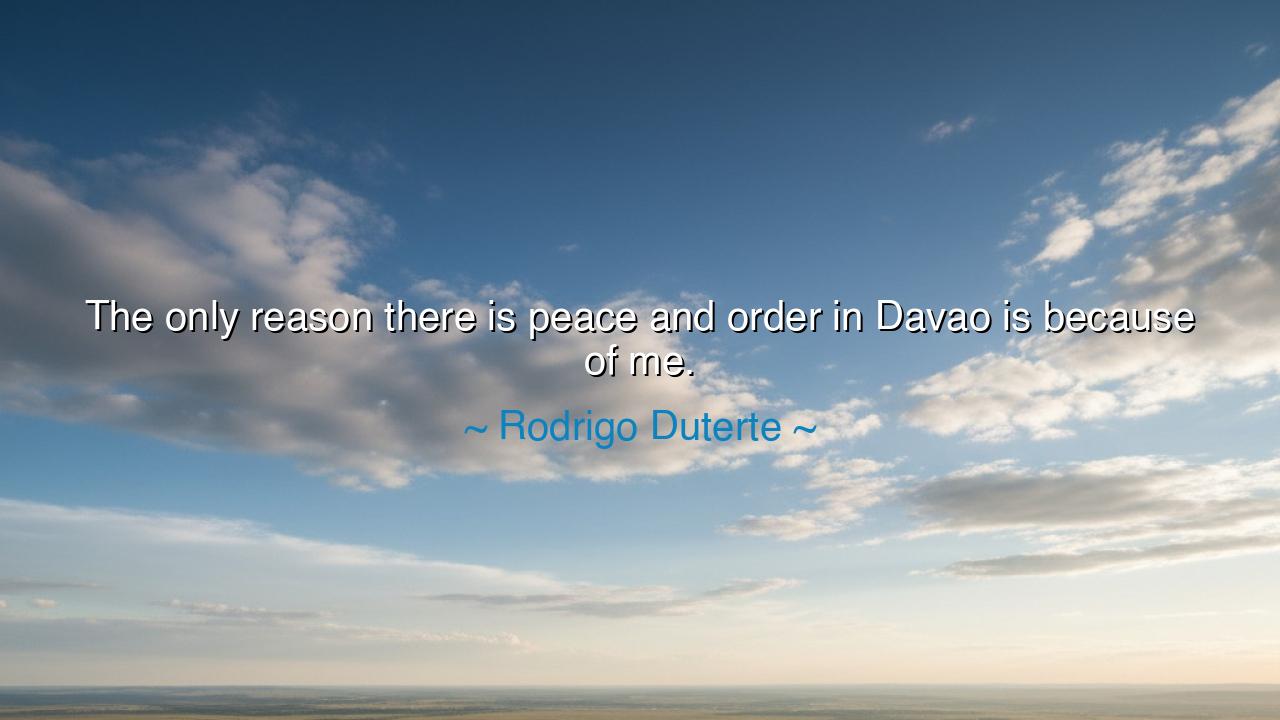
The only reason there is peace and order in Davao is because of






Hear the thunderous claim of Rodrigo Duterte: “The only reason there is peace and order in Davao is because of me.” This saying, sharp as a blade, reveals the heart of a ruler who declares himself the pillar of his city’s stability. He speaks not of institutions, nor of laws, nor of councils of men, but of himself—the man, the will, the enforcer. His words are both boast and warning, for they proclaim that peace and order can be secured by the might of a single leader, and that without him, chaos would reign.
The meaning is not hidden. It is the philosophy of the strongman, the belief that stability flows not from systems but from the presence of a decisive, unflinching figure. In this way, Duterte reflects an ancient archetype: the ruler who claims to be the living wall against disorder, the human bulwark that holds back the tide of lawlessness. For him, peace is not an inheritance of tradition, nor the fruit of gentle persuasion, but a prize wrested through fear, power, and unwavering resolve.
The origin of this claim lies in the city of Davao in the southern Philippines. Once plagued by crime, insurgency, and disorder, Davao was transformed under Duterte’s decades of rule. He became known for his ruthless campaign against lawlessness, employing methods that drew both praise and condemnation. To his supporters, he was the father who protected them from violence; to his critics, he was the iron hand that crushed justice in the name of safety. Thus his words embody the paradox of power: that in ending chaos, one may sow another kind of fear.
History, too, tells of such rulers. Consider Julius Caesar, who proclaimed himself the guardian of Rome’s stability after years of civil war. His hand brought order to a fractured republic, but that order rested upon his person, not upon the Senate or the laws. When Caesar fell beneath the daggers of Brutus and his allies, Rome plunged again into chaos, for the foundations had been built not upon institutions, but upon the will of a single man. So it is with Duterte’s claim: when peace depends on one, the city stands upon precarious ground.
Yet we must not dismiss the truth in his words. For often, in times of turmoil, it is indeed the bold and decisive who impose order where weakness once reigned. Consider Lee Kuan Yew of Singapore, who, though not without criticism, forged from a struggling colony a prosperous nation. He, too, claimed credit for the peace his people enjoyed, for his discipline and vision shaped the destiny of his city-state. Such leaders remind us that sometimes the strength of one man can alter the course of a nation.
But the deeper lesson lies beyond praise or condemnation. True and lasting peace cannot rest forever upon the shoulders of one man. For what happens when that man passes, or when his strength falters? If the people themselves have not learned justice, if the institutions are not strengthened, then the peace is an illusion, fragile as glass. History warns us again and again: where order depends on one, it perishes with him. Where order is shared, taught, and rooted in the people, it endures.
Therefore, let this wisdom be passed on: respect the power of strong leaders, but do not forget that peace and order are most secure when they are not the gift of a ruler, but the culture of a people. In your own life, do not depend upon another to bring you discipline, justice, or harmony. Cultivate it within yourself, and strengthen it within your community. For if each soul becomes a guardian of peace, then no city, no nation, will ever have to lean wholly upon the claim of one man: “I alone am the reason for peace.”






DLLy Hoang Dan Le
This remark raises questions about leadership accountability. It sounds like the speaker views himself as the sole architect of stability, but that can easily lead to abuse of power. Is it possible that this mindset justifies extreme measures under the guise of maintaining peace? History shows that when leaders equate themselves with order, it often comes at the cost of freedom and transparency.
VTVu Tu
I can see why some might admire this confidence, especially if the city truly became safer under his leadership. But at the same time, the claim feels almost authoritarian. Should peace be something that belongs to one person, or should it be something cultivated by a community’s shared values and cooperation? I’m curious how citizens of Davao themselves perceive this claim—pride, gratitude, or fear?
NANguyen Ngoc Anh
This quote makes me uneasy because it suggests that peace is achieved through personal dominance rather than democratic processes. It raises ethical questions about how order is defined—does it mean safety and justice, or just control? If citizens obey out of fear rather than respect, is that really peace? Maybe what’s needed is a deeper conversation about the balance between authority and human rights.
NBNguyen thi ngoc bao
It’s interesting how this kind of statement reflects the mindset of a leader who sees themselves as indispensable. But doesn’t that undermine the role of the people and other governing systems in maintaining order? If peace relies on one figure, it feels fragile and unsustainable. I’d like to know how much of Davao’s stability came from actual reforms versus fear-based governance or enforcement tactics.
TTThu Trang
This statement strikes me as both bold and concerning. It makes me wonder whether true peace and order can ever depend on a single individual. If stability is built around one person’s authority, what happens when that person is gone? Real peace, I think, should come from strong institutions and collective trust—not fear or personality-driven control. Otherwise, isn’t it just temporary harmony under pressure?